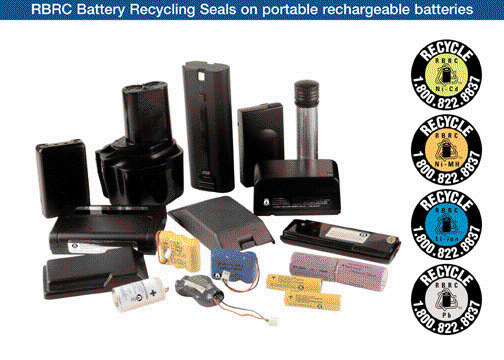Recycling Rechargeable Batteries
What are Rechargeable Batteries?
Some batteries can be recharged by reversing the chemical reaction that takes place when the battery is being used. This allows the battery to be used repeatedly. Rechargeable batteries can replace dozens of non-rechargeable batteries in many cases. Some rechargeable batteries are designed for specialized applications. There are four types of rechargeable batteries: nickel-cadmium, nickel-metal hydride, lithium ion, and small sealed lead-acid. These batteries are used in cordless phones and power tools, lap top computers, video cameras, and many other products. After a certain number of uses these batteries can no longer hold a charge and need to be recycled.
What Does the Law Require For Disposal of Spent Rechargeable Batteries?
Section 22a-256a of the Connecticut General Statutes requires Connecticut municipalities to recycle nickel-cadmium batteries contained in consumer products within three months of the establishment of battery recycling service. Municipalities must provide a recycling option for residentially generated nickel-cadmium batteries. Since February 1, 1996, service has been available for all state residents through the Rechargeable Battery Recycling Corporation (see below) rechargeable battery recycling program.
Businesses that generate used hazardous rechargeable batteries are also prohibited from disposing of them in the solid waste steam in accordance with state hazardous waste regulations. Nickel-cadmium and small sealed lead acid batteries are considered hazardous. The Federal Battery Management Act of 1996 requires all nickel-cadmium batteries to be easily removable, labeled and that all hazardous waste rechargeable batteries to be managed under the provisions of the federal universal waste rule. The Universal Waste Rule is a streamlined regulation for the management of certain hazardous wastes.
What are the Hazards Associated with Nickel-cadmium Batteries?
Although the use of rechargeable batteries is encouraged, long-term exposure to cadmium is associated with a high risk of lung and kidney damage as well as softening of the bones. According to the Agency for Toxic Substances and Disease Registry (ATSDR), cadmium and cadmium compounds "may reasonably be anticipated to be carcinogens". Landfilling batteries can result in the release of cadmium through landfill leachate. Cadmium can enter the air through burning household wastes such as nickel-cadmium batteries. Cadmium is also present in the ash if garbage is incinerated. This is problematic in Connecticut, which relies heavily on waste to energy plants to manage our garbage. Consequently, the removal of these batteries from the solid waste stream is important in protecting human health and the environment.
The RBRC Rechargeable Battery Recycling Program
 The Rechargeable Battery Recycling Corporation (RBRC), a non-profit public service organization made up of battery manufacturers and the products which contain rechargeable batteries, has established an infrastructure for the collection and recycling of all rechargeable batteries. Participating in the RBRC program will allow municipalities to meet the recycling requirements of Section 22a-256a of the Connecticut General Statutes.
The Rechargeable Battery Recycling Corporation (RBRC), a non-profit public service organization made up of battery manufacturers and the products which contain rechargeable batteries, has established an infrastructure for the collection and recycling of all rechargeable batteries. Participating in the RBRC program will allow municipalities to meet the recycling requirements of Section 22a-256a of the Connecticut General Statutes.
There are two major components to the RBRC collection program relative to collection of consumer rechargeable batteries: a retail take-back program and a municipal drop-off program. Under the retail take-back program, participating retail outlets will accept rechargeable batteries from customers and place them in a special box supplied by the RBRC. When the box is full, the retailer simply mails the box to the consolidation facility, with postage paid by the RBRC. By dialing 1-800-8BATTERY (822-8837) and entering the zip code, a resident will be directed to the nearest participating retail outlet. The RBRC website www.call2recycle.org contains information for consumers on where to drop off rechargeable batteries for recycling.
Municipalities also have the option of establishing collections for rechargeable batteries at municipal drop sites. The RBRC will provide 5-gallon containers to the municipality to store the batteries. Once the container is full, it can be shipped via UPS to the RBRC consolidation facility. The RBRC can also accommodate larger containers such as 55-gallon drums. Shipping and recycling costs will be paid by the RBRC. To sign up for the RBRC program municipal program, contact the RBRC at 1-800-8BATTERY or visit www.call2recycle.org.
For more information, contact Tom Metzner at (860) 424-3242 or by postal mail at:
Department of Energy and Environmental Protection
79 Elm Street
Hartford, CT 06106-5127
Content Last Updated January 2020

